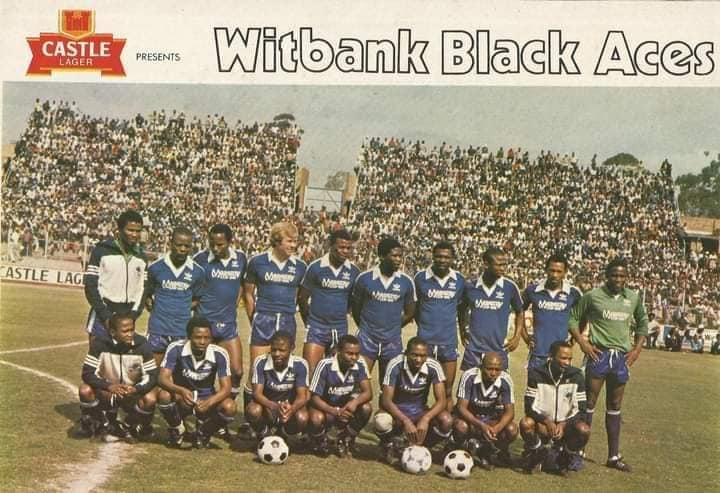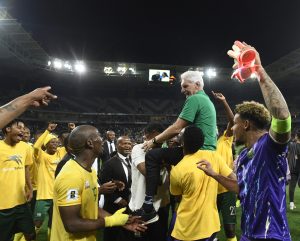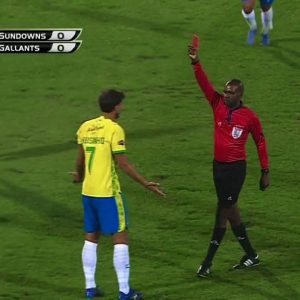Witbank Black Aces, famously known as AmaZayoni, are one of South Africa’s most historic football clubs, with roots tracing back to 1937. Founded by dairy factory worker, Mr. Mshuluzi in Witbank (now eMalahleni), the club grew from humble beginnings to become a respected name in South African football. Over generations, Aces carried the dreams of Mpumalanga’s communities, producing iconic players and enduring multiple reinventions before eventually being sold to Cape Town City FC.
🟨 SECTION 2: Quick Club Overview
| Attribute | Details |
|---|---|
| Full Name | Witbank Black Aces Football Club |
| Nickname | AmaZayoni |
| Founded | 1937 |
| Location (Origin) | Witbank (eMalahleni), Mpumalanga |
| Original Stadiums | Lynnville Stadium, later KwaMhlanga Stadium |
| Status | Defunct (merged to become Cape Town City in 2016) |
| Club Slogans | “Manners Maketh a Man” (Witbank Aces), “Glory to God” (Mpumalanga Aces) |
🟨 SECTION 3: Origins in Witbank
Born From Community, Built on Sacrifice
The story begins in 1937, when Mshuluzi, a KwaNdebele migrant working in a Witbank dairy factory, founded the club with fellow workers. They named it Witbank Black Aces. Mshuluzi, using his own modest earnings, provided players with milk and basic needs. The team played at Lynnville Stadium and later KwaMhlanga Stadium. Their early identity was rooted in discipline and character — best captured by their slogan: “Manners Maketh a Man.”
🟨 SECTION 4: Rise and Fall, and Rise Again
From Glory to Struggle to Rebirth
- 1980s–90s: The club became a household name, producing stars like Bazooka Setshweni, Thomas “Junior” Ngobe (Dumisa Ngobe’s father), Jessey Queen Legodi, Steve “Disco” Makua, Amos “Heel Extension” Mkhari, and Dumisa Ngobe.
- Late 1990s–2002: Financial struggles hit, leading to their relegation from the NSL and eventual collapse in 2002.
- Name Changes: The club operated under various names like Super Kurl Aces, Ukhumba Black Aces, and eventually Dangerous Darkies.
- Ownership Shift: Veli Mahlangu oversaw a relocation to KwaMhlanga during the KwaNdebele government era. After relegation, he sold the club to businessman Robert Gumede, who renamed it Dangerous Darkies and relocated it to Mbombela.
🟨 SECTION 5: The Mpumalanga Black Aces Era
Rebranded, Reignited
In 2004, brothers George and Mario Morfou revived the club by acquiring the Vodacom League side Dangerous Darkies. After failing to gain promotion, they bought the NFD license of City Pillars in 2006 and rebranded the team as Mpumalanga Black Aces. The new Aces debuted in the 2007–08 season, bringing back top-flight hopes to the province.
They made headlines again with coaches like Trott Moloto, and players including Reneilwe Letsholonyane and Siyabonga Nkosi.
🟨 SECTION 6: The Last Dance – Sale to Cape Town City
From Witbank to Cape Town
In 2016, Aces played their final season as Mpumalanga Black Aces. In a surprising move, businessman and former owner of Ajax Cape Town, John Comitis bought the club’s PSL franchise. He relocated and renamed the club Cape Town City FC, ending nearly 80 years of football heritage in Witbank and Mpumalanga.
🟨 SECTION 7: Legacy and Impact
Why AmaZayoni Still Live On
- Founders of Football in Mpumalanga: Among the oldest clubs in the region, representing working-class football spirit.
- Development Powerhouse: Produced football legends.
- Cultural Identity: Their slogans and community-first ethos created a lasting emotional legacy.
- Historic Transitions: One of few clubs to experience so many ownerships, name changes, and relocations — showing both resilience and volatility in SA football.
🟨 SECTION 8: A Story of Pride and Pain
Gone from the Pitch, Never from the Heart
Witbank Black Aces were more than a football team. They were a symbol of working-class determination, township pride, and football faith. Though they no longer exist, their values, and history still breathe through the streets of eMalahleni and KwaMhlanga.


















